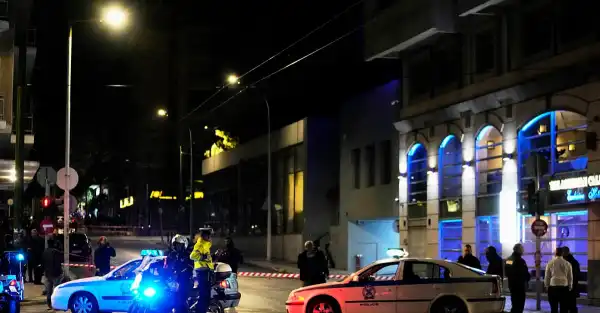
The arrest of an opposition presidential candidate last month sparked the biggest anti-government protests in Turkey in a decade, bringing together demonstrators from different walks of life and sometimes with diametrically opposed political views.
It includes supporters of Istanbul's popular mayor Ekrem Imamoglu and young people who see all politicians as ineffective. The protesters range from the socialist left to the ultra-nationalist right, from university students to pensioners.
What unites them is a sense that President Recep Tayyip Erdogan's government is becoming increasingly authoritarian, denigrating the secular and democratic values and laws on which the country was built.
They are fuelled by anger over Mr Imamoglu's arrest and the government's attempts to suppress the protests that followed.
The protests began after the government on March 19 arrested Mr. Imamoglu, a man seen as posing the most serious electoral threat to Mr. Erdogan in years.
Prosecutors accuse him of corruption and aiding a banned Kurdish organization.
Critics say the charges are a pretext to take down a key rival, but the government denies interfering in the trial.

The largest protests took place alongside rallies by Mr Imamoglu's centre-left, pro-secularist Republican People's Party, known as the CHP, but many young protesters said they did not support the party.
Ogulkan Akti, a 26-year-old university student who works two part-time jobs to support his family, said both the opposition and the ruling party were “liars”.
“Those in power and the opposition that will come later are all the same,” he said.
“We don't trust anyone.”
A few days after the mayor's arrest, thousands of students gathered outside the Istanbul City Hall.
Some waved Turkish flags, others held images of 1970s leftist figures and sang a Turkish version of the Italian protest song “Bella ciao”.
Photos on social media show some protesters making the ultra-nationalist “grey wolf” hand gesture while standing next to others who show the raised leftist fist.
Some showed a peace sign, which is supported by both leftist and pro-Kurdish groups, while others chanted slogans criticizing the banned militant Kurdistan Workers' Party.
Berk Esen, an associate professor of political science at Sabanci University, said most of the protesters he saw were educated, urban young people between the ages of 18 and 25, but that they had little else in common: “It’s a much more amorphous, eclectic group politically,” he said.
One afternoon last week, dozens of Bosphorus University students gathered at a metro station in Istanbul, many wearing masks to avoid reprisals or arrest.

More than 2,000 people, including journalists, have been detained since the protests began.
Around 300 people were formally arrested on charges including “participating in an illegal protest” and “resisting police,” while some were accused of “associations with terrorism.”
Lawyers for the arrested students argue that the charge of “participating in an unlawful protest” does not justify lengthy detention, and that the number of arrests is “unusually high” compared to crimes such as terrorism or drugs.
At the metro station, 22-year-old management student Burak Turan and his girlfriend slipped into a shopping mall and witnessed police officers detaining dozens of protesters.
“We are here because so many students are being arrested without reason,” Mr. Turan said.
“They act as if there was a war going on; they apply martial law.”
Mr Turan refused to wear a mask, saying he had nothing to be ashamed of.
Other protesters include civil servants, artists and pensioners, many of whom support the RNP.
A man in his 60s who watched the standoff outside City Hall said he was there to defend the rights of the younger generation.
“We are not important, they are important. They are our future,” he said.
Others came to speak out against what they saw as Turkey's retreat from secular and democratic values under Mr Erdogan.
Mehtap Bozkurt, a 70-year-old pensioner and CHP supporter, joined the protest outside Istanbul City Hall.
“This country is secular and will remain secular,” she said.
“We will resist to the end. I am ready to give my life and blood for this problem.”
This does not mean the protesters are not Muslim, said Mr. Esen, the academic from Sabanci.
“Among the protesters there are Muslims, religious people and those who at least perform some religious duties,” he said.
“But they also probably consider themselves secular.”
Outside the courthouse in Istanbul, parents and relatives, some holding flowers, kept an anxious vigil.
Some hoped for the immediate release of their loved one, while others were overcome with disappointment.

One family member, who asked to remain anonymous for fear of government reprisals, told local media that the detained students “studied day and night to get into top universities.”
“Look at how they are treated now. There are no rights. There is no law. There is no justice,” she said.
Another woman showed reporters a photo of her son with a black eye.
“He told me, 'Mom, they beat me,'” she said with tears in her eyes.
Another woman said she had cancer and had been waiting since dawn.
“What did these kids do? Did they kill someone? What did they even do?”
Around 300 protesters spent Eid in prison, away from their families.
Lawyers for several protesters told The Associated Press that the students are being held in overcrowded cells and subjected to physical and verbal abuse and limited access to food because prison commissaries are closed for the Eid holiday.
Lawyers also fear that students could miss exams or be expelled as “punishment” for participating in the protests.
On Thursday, police issued a statement calling allegations that the women were sexually assaulted in custody a “vile slander.”
According to the Ministry of Internal Affairs, at least 150 police officers were injured in clashes with demonstrators.
Footage from the protests showed riot police using tear gas and plastic balloons, and students throwing plastic water bottles and flares.
Mr Esen believes the protests could be a turning point for Turkey.
“Will the police violence that the government is using against them force them to give in at some point or will it lead to a larger confrontation and make this a long-term thing?
“If the latter happens, I will be very optimistic that Türkiye will become democratic again.
“If the first happens, it will all lead to a very bad outcome,” he said.
A young female protester wearing a mask watched as a standoff with police unfolded outside City Hall last week.
“I am here today because I do not accept autocracy,” she said.
“The arrest of Ekrem Imamoglu means that we accept that there will be no more elections in this country.
“I don't accept this.”
Sourse: breakingnews.ie



